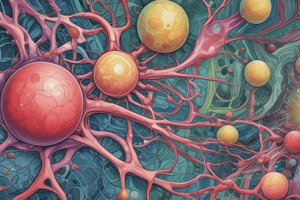Podcast
Questions and Answers
What is the main focus of the study of human anatomy?
What is the main focus of the study of human anatomy?
- Ecosystems and their interactions
- Evolutionary changes in the human body
- Structures, systems, and organs of the human body (correct)
- The smallest unit of life
Which cellular component is responsible for energy production in a cell?
Which cellular component is responsible for energy production in a cell?
- Ribosomes
- Mitochondria (correct)
- Chloroplasts
- Endoplasmic reticulum
What do ecologists primarily study in ecosystems?
What do ecologists primarily study in ecosystems?
- Cellular components of living organisms
- Ecosystem structure and function (correct)
- Human anatomy and physiology
- Genetic composition of populations
Which organelle is involved in protein synthesis within a cell?
Which organelle is involved in protein synthesis within a cell?
What does the study of evolution primarily focus on?
What does the study of evolution primarily focus on?
Which aspect allows us to comprehend how life processes occur in humans?
Which aspect allows us to comprehend how life processes occur in humans?
What is the main focus of genetics?
What is the main focus of genetics?
Which technology is NOT mentioned in the text as facilitating understanding of gene function and regulation?
Which technology is NOT mentioned in the text as facilitating understanding of gene function and regulation?
What determines phenotype in genetics?
What determines phenotype in genetics?
Which of the following is NOT mentioned as a mechanism driving evolution in the text?
Which of the following is NOT mentioned as a mechanism driving evolution in the text?
What does Darwinian selection explain in evolution?
What does Darwinian selection explain in evolution?
How does studying genetics aid conservation efforts?
How does studying genetics aid conservation efforts?
Flashcards are hidden until you start studying
Study Notes
Human Anatomy
The study of human anatomy involves understanding the structures of the human body, its systems, and organs. Key aspects include the skeleton, muscles, nervous system, digestive tract, endocrine system, respiratory system, and circulatory system. Understanding these components allows us to comprehend how life processes occur in humans.
Cell Structure
Cellular structure focuses on the smallest unit of life—the cell. Components include nucleotides, proteins, lipids, carbohydrates, membranes, chloroplasts, mitochondria, Golgi apparatus, endoplasmic reticulum, lysosomes, ribosomes, centrioles, microfilaments, microtubules, actin, histones, chromatin, nuclear pores, and telomeres. These parts interact to carry out essential functions such as protein synthesis, energy production, cell division, growth, and repair.
Ecosystems
An ecological system consists of living organisms and their non-living environment. It encompasses relationships between plants and animals, as well as interactions among various elements such as soil, water, air, and sunlight. Ecologists examine patterns of distribution, abundance, behavior, and interaction of individuals within populations and communities. By studying ecosystems, we gain insights into factors affecting natural environments and human influence on them.
Evolution
Evolution is the change over time in characteristics of a population due to changes in genetic composition. It occurs through genetic variation, differential reproduction rates, and mutation pressure. Darwinian selection explains how traits become more or less frequent in subsequent generations. Mechanisms driving evolution include genetic drift, gene flow, mutation, migration, hybridization, heterosis, and human intervention. Studying evolution gives insight into ancestral relationships, adaptability, speciation, extinction, and our role in preserving biodiversity.
Genetics
Genetics studies heritable traits passed from parent to offspring. It focuses on genes, which consist of DNA sequences encoding proteins responsible for development, functioning, survival, and reproduction. Technologies such as cloning, cross breeding, selective breeding, and molecular techniques facilitate understanding of gene function and regulation. Gene expression determines phenotype, which refers to observable physical and behavioral traits. Genetic inheritance patterns reveal evolutionary connections and aid conservation efforts.
Understanding these five core areas of biology provides a foundation for exploring broader issues related to health, medicine, agriculture, environmental science, and technology advancement.
Studying That Suits You
Use AI to generate personalized quizzes and flashcards to suit your learning preferences.




